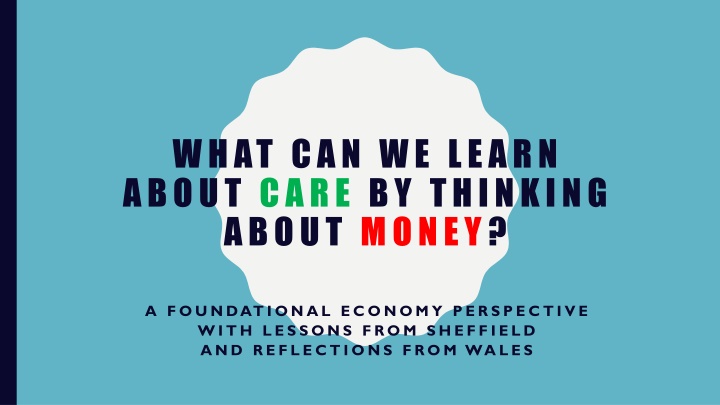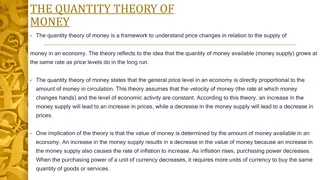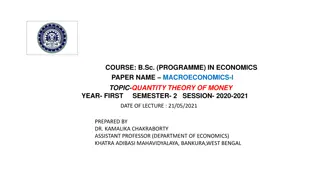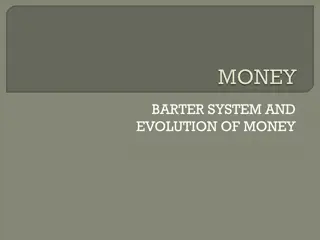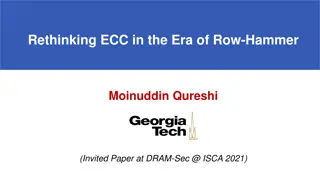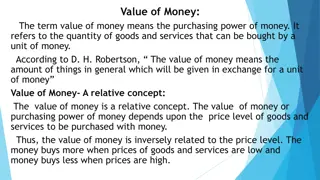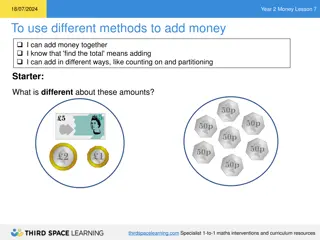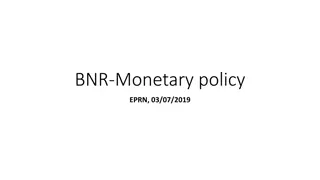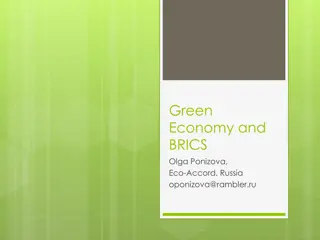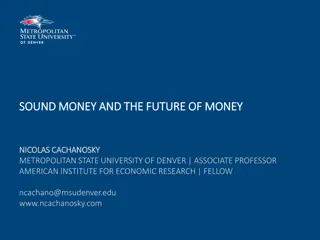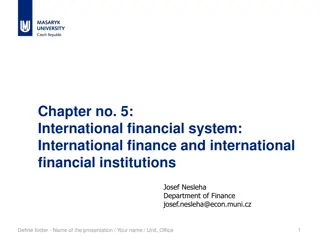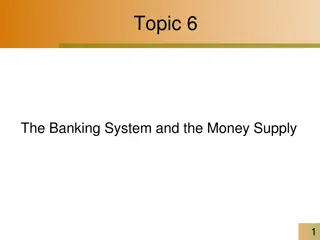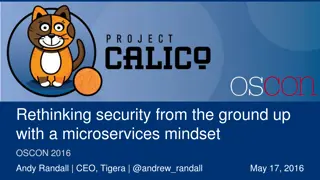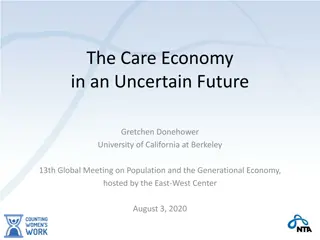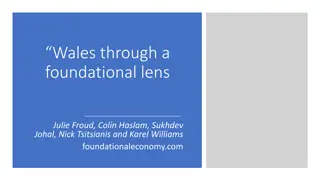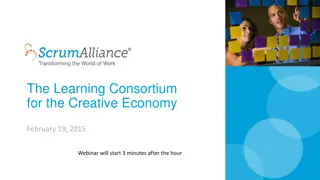Rethinking Care and Money: Insights from a Foundational Economy Perspective
Exploring the intersection of care and money through a foundational economy lens, this analysis delves into the economic aspects of providing care, the impact of funding on care services, and the need for a shift in spending strategies. It emphasizes the importance of efficient fund utilization and sustainable investment in the care sector to avoid detrimental consequences like profit-driven exploitation. The discussion also highlights the potential of a virtuous circle where care supports the economy, contrasting with a vicious cycle of care hindering economic well-being.
Download Presentation

Please find below an Image/Link to download the presentation.
The content on the website is provided AS IS for your information and personal use only. It may not be sold, licensed, or shared on other websites without obtaining consent from the author.If you encounter any issues during the download, it is possible that the publisher has removed the file from their server.
You are allowed to download the files provided on this website for personal or commercial use, subject to the condition that they are used lawfully. All files are the property of their respective owners.
The content on the website is provided AS IS for your information and personal use only. It may not be sold, licensed, or shared on other websites without obtaining consent from the author.
E N D
Presentation Transcript
WHAT CAN WE LEARN ABOUT CARE BY THINKING ABOUT MONEY? A FOUNDATIONAL ECONOMY PERSPECTIVE WITH LESSONS FROM SHEFFIELD AND REFLECTIONS FROM WALES
THE FOUNDATIONAL ECONOMY VIEW OF CARE The Foundational Economy means those economic activities needed to deliver the essentials for a civilised life. Paid-for care is clearly a part of this economy, and in fact represents a large and growing employment sector. The characteristics of the paid-for care system can significantly help or hinder local economic well-being NOTE: Most care is informal and it is right and essential that this remains so
THE FOUNDATIONAL ECONOMY VIEW OF CARE There is strong evidence that care is under-funded But also that the funds available are not used to best effect: unhelpful service designs unhelpful business models
THE VIRTUOUS CIRCLE OF CARE AS PART OF THE FOUNDATIONAL ECONOMY THE FUNDED THE FUNDERS Care helping the Economy Essential jobs in every locality Recycling public and citizen funds Using every penny to good effect Decent wages and local careers Desirable community strength Recycling social care funds Valuing the care workforce Valuing informal carers Investing for sustainability Building an ecology of supports The Economy helping Care
THE VICIOUS CIRCLE OF CARE AS PART OF THE COMPETITIVE-TRADE ECONOMY THE FUNDED THE FUNDERS Care hindering the Economy Precarious jobs and high turnover Community coping as best it can Excessive levels of profit extraction Funds wasted on tick-box services Low pay and few career paths Cost based competition Rewards for remote and ruthless Low (and unequal) pay for locals Inflexible packages of care Culture of self-interest The Economy hindering Care
YES WE NEED MORE MONEY FOR CARE BUT On its own, the proper funding of care will simply lead to a feeding frenzy by private equity which would mean we get more extraction and instability Professor Karel Williams The Foundational Economy perspective is absolutely clear that we must change the way we spend our money and not just ask for more
CHANGE HOW WE BUY, WHAT WE BUY, AND WHO WE BUY FROM CHANGE the current way we commission and procure CHANGE from bio-medical, commodity-packages of market-friendly care CHANGE from businesses with no commitment to the local stakeholders in the care economy
CRESC PUBLIC INTEREST REPORTS FOUNDATIONAL ECONOMY & SOCIAL CARE
WHAT IS NEEDED? IMAGINATIVE CARE TO CREATE STABILISED, LOCAL, ECO-SYSTEMS Experiments in Doing Care Differently in England home care for older people - Capacity to meet fluctuating demands - Commissioning for quality (improve wellbeing not just bio-medical maintenance) - Adopt and adapt care models (move away from task and time) - Care jobs with quality, meaning and progression - Care tailored to community wants
ADAPTING EXISTING CARE MODEL Home care pilot 5 months to test rebalancing service quantity and quality through commissioning Q. What preventative measures can home care providers be supported to take to reduce the likelihood of their clients being admitted/re-admitted to hospital? Focus 1-2 providers holding primary contract Identified clients at higher risk of admission; provider commissioned additional time with clients Care Workers offer specific guidance, practical support and undertake basic risk assessment (with due training/guidance from PC) Increase opportunity for engagement with client reduce isolation and increase person- centred approach Evaluation of changes and benefits for clients, family carers, care workers track reduction in avoidable admission to hospital, saved and improved quality of care and job quality
LESSONS LEARNED ON ADAPTING EXISTING MODELS Innovation requires more than increased funding to buy extra minutes of CW time. Very little of the additional funds made available to providers to pay for increased worker time on visits was used! Innovation requires designated and appropriately skilled human resource to manage implementation not add- on. Asking providers to generate new activity from within a tightly calibrated local care system in which commissioning specification/contracts encourage task/time model narrowing design of jobs version of bio-medical care! Innovation requires insulation from demands/pressures of local NHS. Little capacity to increase the length of visits with existing clients, due to demand to pick up new cases (LA performance is measured on DTOC rates)! Pay attention to timing, avoid winter crisis ! Innovation objectives clash with Business Model objectives. Providers whose BM involve generating profit through loading up visits interests aren t served by initiatives to increase time to focus on psycho-social dimensions of life with existing clients!
ADOPTING ALTERNATIVE CARE MODELS New venture by South Yorkshire Housing Association Doing Care Differently Influenced and informed by CRESC Public Interest Report - Why we need social innovation in home care for older people Visioningplace and size of provision, what matters to people in the community, what matters to primary care providers, what matters to care workers, what matters to LA commissioners Values - See the person Designing service Buurtzorg Model inspired, Business model good job quality, good care quality, good outcomes for community Fact finding visiting (SYHA, NHS and LA commissioners) of innovating services proven to work e.g. Cornerstone in Glasgow Particulars: Self-funded and state funded clients with an aim to provide service within LA hourly fee rate Recruiting staff from within the local area + good pay and conditions, training and support Care worker own case load + link person with people, family, professionals Neighbourhood and support teams - self-organising, upskilled care worker teams, making decisions & solving problems Use of technology to keep care workers, care recipients and families in touch Minimising time spent on process and paperwork Strong partnership with commissioners and regulators Looking at systems for mentoring and coaching staff rather than traditional management + support from the centre Evaluation plan in development; launch Autumn 2018
REFLECTIONS FROM THE REGULATOR OF CARE IN WALES What positive things are happening to address the Foundational Economy perspective on Care in Wales? The need for innovation The need for a shift in commissioning and procurement methods The need for consistent quality What are some of the challenges which we need to acknowledge in seeking to progress the Foundational Economy agenda in Care? Health and social care integration Closing remarks
WHAT CAN WE LEARN ABOUT CARE BY THINKING ABOUT MONEY? Foundational Economy Conference - 2018 - Ebbw Vale Presenters: Sue Evans Diane Burns Adrian Roper Social Care Wales University of Sheffield Cartrefi Cymru Co-operative
